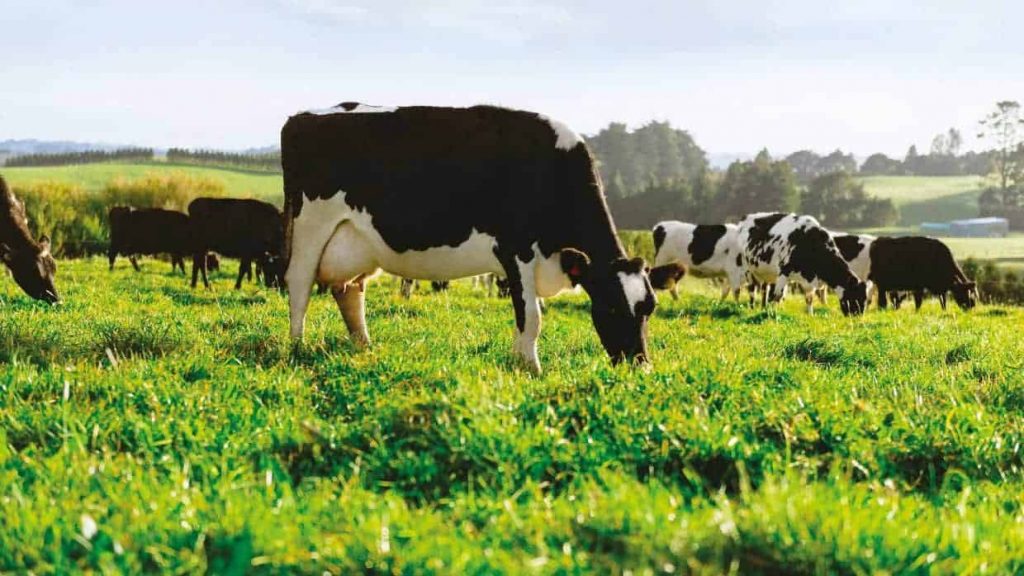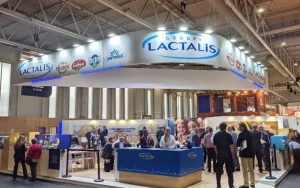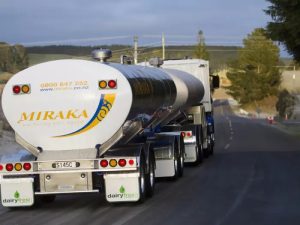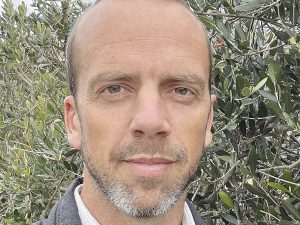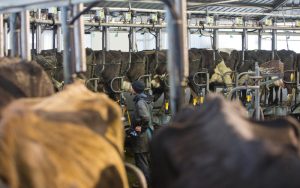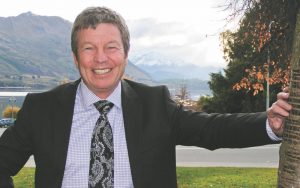
Fonterra, which holds the unenviable title of New Zealand’s biggest greenhouse gas emitter, is poised to announce targets to reduce its largest source of emissions – those that come from its farmer suppliers.
The co-operative’s 9000 farmers have been bracing themselves since Fonterra flagged its intention to set a target at its annual meeting in November last year. Since then, it has held meetings with farmers up and down the country to prepare them for an announcement in the middle of this year.
Fonterra is facing pressure from overseas markets, big customers and banks to improve sustainability. While the co-operative has been reducing its Scope 1 and 2 emissions, generated primarily by its manufacturing sites and transport operations, it hasn’t yet set a target for Scope 3, which cover indirect emissions from its farm suppliers and account for more than 90% of its tally.
For farmers, the pending Scope 3 emissions target is coming at a challenging time as they are busy with calving and already grappling with increased regulation, high costs and the shock of a sharply reduced farmgate milk price forecast for this season which will result in most sustaining significant losses. Farmer confidence is at a record low.
“It is quite a live topic amongst farmers,” says John Stevenson, a fifth generation Wairarapa dairy farmer who chairs the Fonterra Co-operative Council which represents the views of farmers.
“From a farming standpoint, there’s currently no understanding of what that target will be, what it will mean for farmers and the impact that it will have on their businesses.
“Getting rid of uncertainty is always good and having some certainty around what the future holds around Scope 3 emissions would be beneficial for farmers. But at the moment, a lot of our farmers are right in the middle of calving, so their bandwidth is quite limited for being able to allocate time to understand what the impact of this will be on their own businesses.”
Stevenson says farmers are suffering from “change fatigue” and it’s hard to gauge how they will react to a Scope 3 target without knowing what the figure is and what it means for their businesses.

Fonterra director of sustainability Charlotte Rutherford says the co-operative plans to introduce an “intensity target” with the goal of reducing the amount of carbon produced per kilogram of milk solids, rather than target an absolute reduction.
“That’s really critical because an absolute target could be pretty swiftly achieved by cutting cow numbers or having less milk,” she told a webinar. “This is very much about efficiency on farm, so producing less carbon for the same amount of milk – not about reducing milk.”
She says the target would be achieved through improved farm efficiency as well as other measures like sequestration.
That’s welcome news to farmers who are always looking to be as efficient as they can, says Stevenson.
He says farmers will be looking to Fonterra to help them reduce emissions, noting that the farmer-owned co-operative has already invested millions in sustainability initiatives and in innovations to reduce livestock methane emissions through the likes of genetics, feed additives and vaccines.
“We will be looking for them to support our farmers to achieve whatever goal that Fonterra sets,” he says.
“A constrained milk price environment makes it tougher for farmers to make big investments in productivity innovations, but we will be looking towards our co-operative to assist us in that space, and we understand that they are doing an amount of work,” he says.
Fonterra is in a stronger financial position to support its farmers, having sold assets to strengthen its balance sheet over the past five years.
The co-operative has warned farmers that it risks losing customers and facing trade barriers in its overseas markets if it doesn’t meet sustainability expectations. For some of its customers, the largest component of their Scope 3 emissions are those coming from Fonterra.
Both Fonterra and its farmers are likely to come under increasing pressure from banks in the future over their emissions footprints when they want access to funding.
Regulation is also looming which will require big listed companies to report on their climate risks and mitigations, and activists are increasingly taking companies to court for not managing their effects on climate.
The co-operative has canvassed its Scope 3 plan with its key strategic customers, banks and markets and says they support its approach.
International companies such as Cargill, Glanbia, Kerry Group and Tyson Foods have also adopted an “intensity” target, and it is used by local companies such as Synlait Milk and Olam Food Ingredients.
Fonterra believes the approach allows it to deliver emissions reduction in line with the Science Based Target to limit global warming to 1.5 degrees, while driving efficiency and productivity with its farmers.
It is seeking accreditation with the Science Based Target initiative, a globally recognised organisation that defines and promotes best practice in science-based target setting.
Auckland University of Technology ethics and sustainability professor Marjo Lips-Wiersma welcomes Fonterra’s commitment to the Science Based Target initiative.
She says Fonterra needs to meet three challenges at the same time: to produce milk more efficiently, to set and achieve a peak milk target so that efficiency gains reduce overall gross emissions, and to ensure that farmers can continue to thrive by researching and funding a partial but rapid transition to plant-based foods.
Lips-Wiersma is confident a Scope 3 target to produce milk more efficiently can be reached as farmers are already making good progress.
Rutherford says Fonterra’s customers are setting their own carbon reduction roadmaps and targets and were becoming “very interested” in all of Fonterra’s scopes.
“Historically, commercial negotiations would have been centred around price and volume and specification and food safety and milk quality,” she says. “But now our customers are very much wanting to know and ask questions right back to the farm, practices that are happening on farm, what a farmer is doing in terms of the start of that supply chain of the product that they then want to buy from us.
“A large proportion of my time within what those practices are is dedicated to on-farm emissions.”
Customers visiting Fonterra were now all bringing their chief sustainability officers rather than just their procurement team, she notes.
“The focus on sustainability has dominated all of those customer visits,” she says.
Stevenson says that while some farmers were on board with the changes, the co-operative’s 9000 farmer suppliers were a “broad church”.
“Uncertainty is quite unsettling, particularly in the current environment,” he says. “I don’t think the job’s done in terms of getting Fonterra farmers on board with this. I think that the business does understand that and there’s a lot more work to do once a Scope 3 emissions target is announced.”
Stevenson says farmers want to see Fonterra deliver a premium for low emission dairy products.
“We’ve been pushing the board quite hard on this for about 18 months in terms of ensuring that essentially the juice is worth the squeeze in terms of making these changes.
“What we’ve heard from Fonterra board and management is that it is hard to identify that premium at this stage on a consistent basis. But we will be looking to the business to be able to demonstrate that to farmers as we continue to make changes and reinforce our position as a global leader in terms of low emissions dairy products.
“If you make changes to the way that you’re doing things and it involves investment of capital, naturally, like any business, you want to see a return for that additional effort and investment.”
